Toyota RAV4 (XA50) 2019-2026 Owners Manual: If you have a flat tire
Your vehicle is equipped with a spare tire. The flat tire can be replaced with the spare tire.
WARNING
Ō¢ĀIf you have a flat tire
Do not continue driving with a flat tire.
Driving even a short distance with a flat tire can damage the tire and the wheel beyond repair, which could result in an accident.
Before jacking up the vehicle
- Stop the vehicle in a safe place on a hard, flat surface.
- Set the parking brake.
- Shift the shift lever to P.
- Stop the engine.
- Turn on the emergency flashers.
- For vehicles with power back door: Turn off the power back door system.
Location of the spare tire, jack and tools
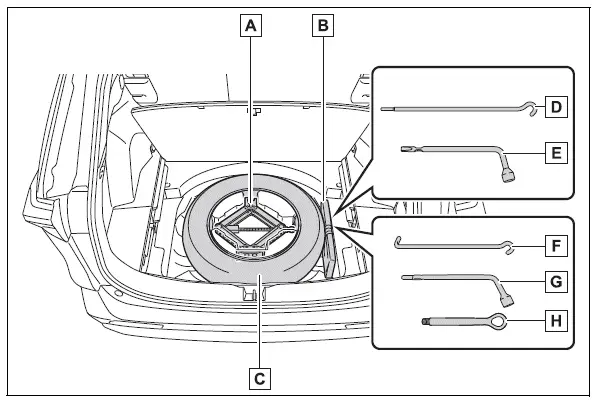
- Jack
- Tool bag
- Spare tire
- Jack handle*1
- Wheel nut wrench*1
- Jack handle*2
- Wheel nut wrench*2
- Towing eyelet*2 (if equipped)
*1:Except for models made in Japan*3 *2:For models made in Japan*3 *3:The country of production is written on the Certification Regulation Label.
WARNING
Ō¢ĀUsing the tire jack
Observe the following precautions.
Improper use of the tire jack may cause the vehicle to suddenly fall off the jack, leading to death or serious injury.
- Do not use the tire jack for any purpose other than replacing tires or installing and removing tire chains.
- The equipped jack can only be used with your vehicle. Do not use it with other vehicles.
- And do not use jacks from other vehicles with your vehicle.
- Put the jack properly in its jack point.
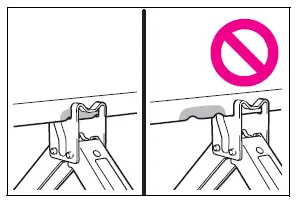
- Do not put any part of your body under the vehicle while it is supported by the jack.
- Do not start the engine or drive the vehicle while the vehicle is supported by the jack.
- Do not raise the vehicle while someone is inside.
- When raising the vehicle, do not put an object on or under the jack.
- Do not raise the vehicle to a height greater than that required to replace the tire.
- Use a jack stand if it is necessary to get under the vehicle.
- Stop the vehicle on firm, flat and level ground, firmly set the parking brake and shift the shift lever to P. Block the wheel diagonally opposite to the one being changed if necessary.
- When lowering the vehicle, make sure that there is no-one near the vehicle. If there are people nearby, warn them vocally before lowering.
Taking out the jack
1. Open the deck board
2. Take out the jack.
Do not touch the threaded portion of the jack as it is greased.
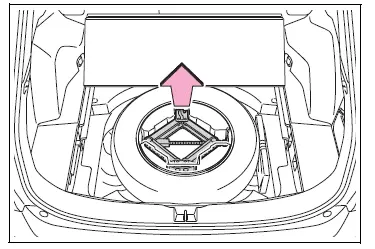
Taking out the tool bag
Take out the tool bag.
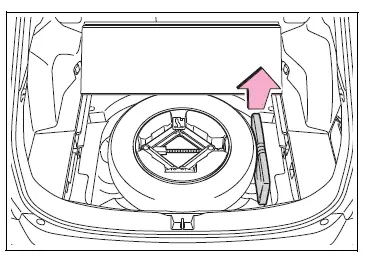
Taking out the spare tire
1. Take out the jack holder.
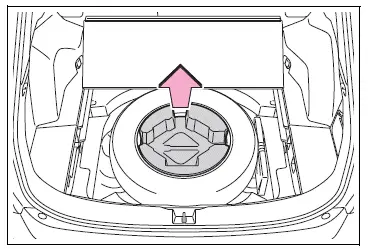
2. Loosen the center fastener that secures the spare tire.
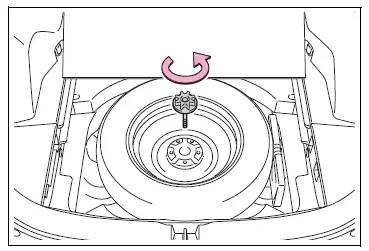
WARNING
Ō¢ĀWhen storing the spare tire
Be careful not to catch fingers or other body parts between the spare tire and the body of the vehicle.
Replacing a flat tire
1. Chock the tires.
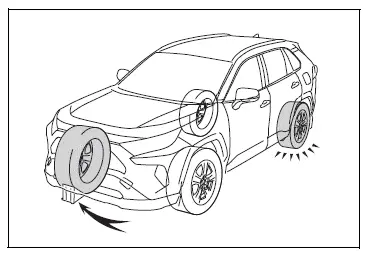
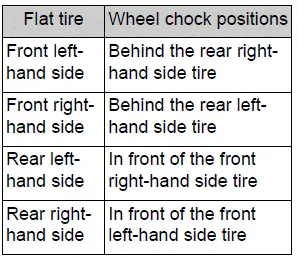
2. For vehicles with full wheel ornament: Remove the wheel ornament using the wrench.
To prevent damage, cover the tip of the wrench with a rag.
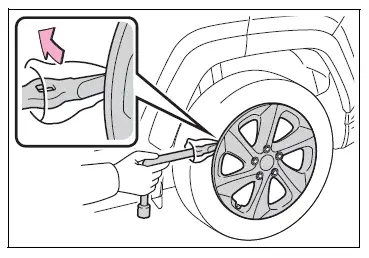
3. Slightly loosen the wheel nuts (one turn).
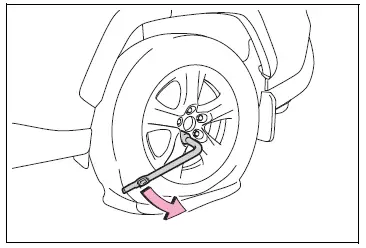
4. Turn the tire jack portion A by hand until the notch of the jack is in contact with the jack point.
After removing the jack from the jack holder, turn the jack portion A in the opposite direction to lower the jack, and then adjust the jack set position.
The jack point guides are located under the rocker panel. They indicate the jack point positions.
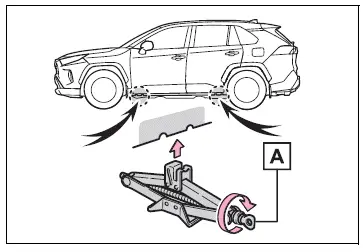
5. Assemble the jack handle and the wheel nut wrench as shown in the illustration.
Except for models made in Japan*
*: The country of production is written on the Certification Regulation Label.
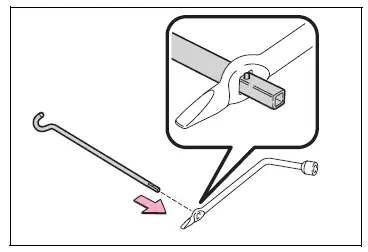
For models made in Japan*
*: The country of production is written on the Certification Regulation Label.
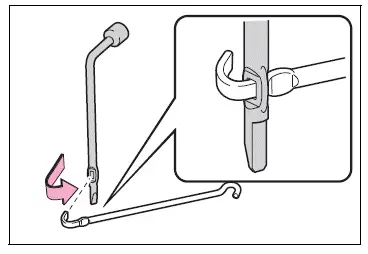
6. Raise the vehicle until the tire is slightly raised off the ground.
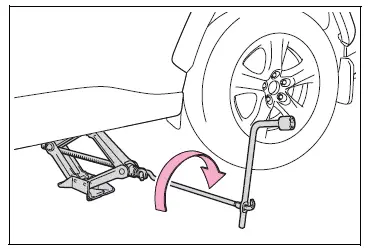
7. Remove all the wheel nuts and the tire.
When resting the tire on the ground, place the tire so that the wheel design faces up to avoid scratching the wheel surface.
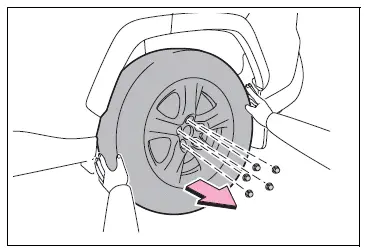
WARNING
Ō¢ĀReplacing a flat tire
- Do not touch the disc wheels or
the area around the brakes
immediately after the vehicle
has been driven.
After the vehicle has been driven the disc wheels and the area around the brakes will be extremely hot. Touching these areas with hands, feet or other body parts while changing a tire, etc. may result in burns.
- Failure to follow these precautions could cause the wheel nuts to loosen and the tire to fall off, resulting in death or serious injury.
- After replacing a tire, check the tightening torque as soon as possible.
Wheel nut torque: 76 ft-lbf (103 N-m, 10.5 kgf-m)
- Do not attach a heavily damaged wheel ornament, as it may fly off the wheel while the vehicle is moving.
- When installing a tire, only use wheel nuts that have been specifically designed for that wheel.
- If there are any cracks or deformations in the bolt screws, nut threads or bolt holes of the wheel, have the vehicle inspected by your Toyota dealer.
- When installing the wheel nuts, be sure to install them with the tapered ends facing inward.
- For vehicles with power back door: In cases such as when replacing tires, make sure to turn off the power back door system. Failure to do so may cause the back door to operate unintentionally if the power back door switch is accidentally touched, resulting in hands and fingers being caught and injured.
Installing the spare tire
1. Remove any dirt or foreign matter from the wheel contact surface.
If foreign matter is on the wheel contact surface, the wheel nuts may loosen while the vehicle is in motion, causing the tire to come off.
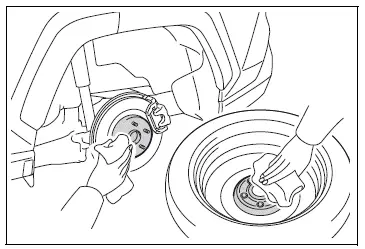
2. Install the spare tire and loosely tighten each wheel nut by hand by approximately the same amount.
When replacing a steel wheel with a steel wheel, tighten the nuts until the tapered portion (A) comes into loose contact with the disc wheel seat (B).
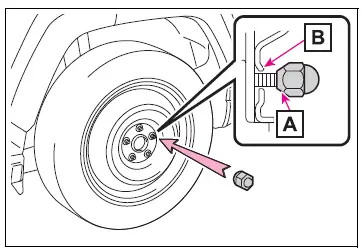
When replacing an aluminum wheel with a steel wheel, tighten the wheel nuts until the tapered portion (A) comes into loose contact with the disc wheel seat (B).
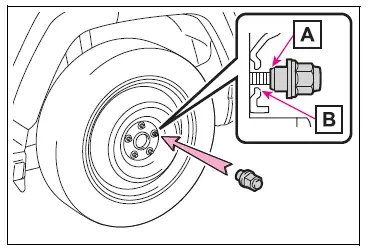
When replacing an aluminum wheel with an aluminum wheel, turn the wheel nuts until the washers (A) come into contact with the disc wheel (B).
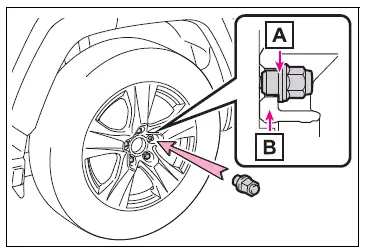
3. Lower the vehicle.
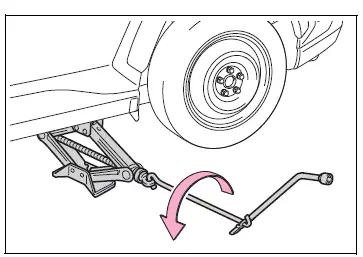
4. Securely tighten the wheel nuts two or three times in the order shown in the illustration using a wheel nut wrench.
Tightening torque: 76 ft-lbf (103 N-m, 10.5 kgf-m)
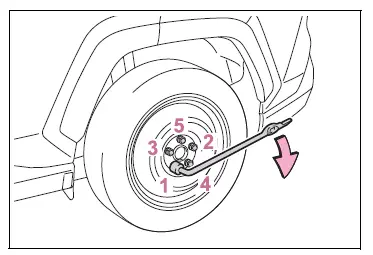
5. For vehicles with full wheel ornament: When reinstalling an original wheel, reinstall the wheel ornament*.
Align the cutout of the wheel ornament with the valve stem as shown.
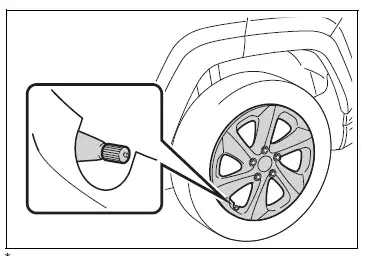
*: The wheel ornament cannot be installed on the compact spare tire.
6. Stow the flat tire, tire jack and all tools.
Ō¢ĀThe compact spare tire
- The compact spare tire is identified
by the label "TEMPORARY
USE ONLY" on the tire sidewall.
Use the compact spare tire temporarily, and only in an emergency.
- Make sure to check the tire inflation pressure of the compact spare tire.
Ō¢ĀWhen using the compact spare tire
As the compact spare tire is not equipped with a tire pressure warning valve and transmitter (if equipped), low inflation pressure of the spare tire will not be indicated by the tire pressure warning system.
Also, if you replace the compact spare tire after the tire pressure warning light comes on, the light remains on.
Ō¢ĀWhen the compact spare tire is attached
The vehicle height may become lower when driving with the compact spare tire compared to when driving with standard tires.
Ō¢ĀIf you have a flat front tire on a road covered with snow or ice
Install the compact spare tire on one of the rear wheels of the vehicle.
Perform the following steps and fit tire chains to the front tires:
1. Replace a rear tire with the compact spare tire.
2. Replace the flat front tire with the tire removed from the rear of the vehicle.
3. Fit tire chains to the front tires.
Ō¢ĀWhen stowing the jack
Before storing the jack, adjust the height of the jack to match the shape of the jack holder.
The storage direction of the jack differs depending on the type, so make sure to store the jack in the correct direction.
Except for models made in Japan*:
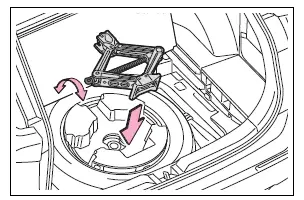
For models made in Japan*:
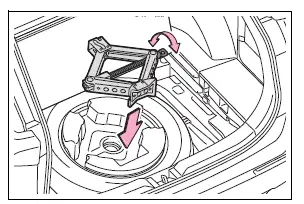
*: The country of production is written on the Certification Regulation Label.
WARNING
Ō¢ĀWhen using the compact spare tire
- Remember that the compact spare tire provided is specifically designed for use with your vehicle. Do not use your compact spare tire on another vehicle.
- Do not use more than one compact spare tire simultaneously.
- Replace the compact spare tire with a standard tire as soon as possible.
- Avoid sudden acceleration, abrupt steering, sudden braking and shifting operations that cause sudden engine braking.
Ō¢ĀWhen the compact spare tire is attached
The vehicle speed may not be correctly detected, and the following systems may not operate correctly:
- ABS & Brake assist
- VSC/Trailer Sway Control
- TRAC
- Dynamic radar cruise control with full-speed range
- PCS (Pre-Collision System)
- EPS
- LTA (Lane Tracing Assist)
- Tire pressure warning system (if equipped)
- AHB (Automatic High Beam)
- BSM (if equipped)
- RCTA (if equipped)
- PKSB (if equipped)
- Intuitive parking assist (if equipped)
- Downhill assist control system (if equipped)
- Rear view monitor system (if equipped)
- Panoramic view monitor (if equipped)
- Toyota parking assist monitor (if equipped)
- Navigation system (if equipped)
Also, not only can the following systems not be utilized fully, but they may actually negatively affect the drive-train components:
- Dynamic Torque Control AWD system (if equipped)
- Dynamic Torque Vectoring AWD system (if equipped)
Ō¢ĀSpeed limit when using the compact spare tire
Do not drive at speeds in excess of 50 mph (80 km/h) when a compact spare tire is installed on the vehicle.
The compact spare tire is not designed for driving at high speeds. Failure to observe this precaution may lead to an accident causing death or serious injury.
Ō¢ĀAfter using the tools and jack
Before driving, make sure all the tools and jack are securely in place in their storage location to reduce the possibility of personal injury during a collision or sudden braking.
NOTICE
Ō¢ĀBe careful when driving over bumps with the compact spare tire installed on the vehicle
The vehicle height may become lower when driving with the compact spare tire compared to when driving with standard tires. Be careful when driving over uneven road surfaces.
Ō¢ĀDriving with tire chains and the compact spare tire
Do not fit tire chains to the compact spare tire.
Tire chains may damage the vehicle body and adversely affect driving performance.
Ō¢ĀWhen replacing the tires (vehicles with tire pressure warning system)
When removing or fitting the wheels, tires or the tire pressure warning valve and transmitter, contact your Toyota dealer as the tire pressure warning valve and transmitter may be damaged if not handled correctly.
 If a warning message is displayed
If a warning message is displayed
The multi-information display
shows warnings of system
malfunctions,
incorrectly performed operations,
and messages that
indicate a need for maintenance.
When a message is
shown, perform the correcti ...
 If the engine will not start
If the engine will not start
If the engine will not start
even though correct starting
procedures are being
followed, consider
each of the following
points:
The engine will not start
even though the starter
motor operates normall ...
Other materials:
Reassembly
Hint:
When installing the ornament plate and emblem, heat the
radiator grille, ornament plate and emblem using a heat light.
Standard heating temperature
Notice:
Do not heat the radiator grille, ornament plate and
emblem excessively.
Install radiator grille emblem
Attach ...
Intake air temperature circuit malfunction
Description
The intake air temperature (iat) sensor, mounted on the mass air flow (maf)
meter, monitors the iat.
The iat sensor has a built-in thermistor with a resistance that varies according
to the temperature of the
intake air. When the iat is low, the resistance of the thermist ...
Cooling fan system
Parts location
System diagram
On-vehicle inspection
Hint:
It is normal for the cooling fan to sometimes rotate when the
ignition switch is turned from acc to on.
Check cooling fan operation at low temperatures (below 94┬░c (201┬░f))
Turn the ignition switch on with the a/c ...
